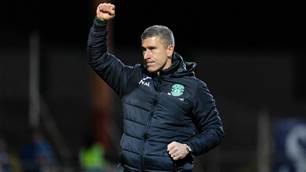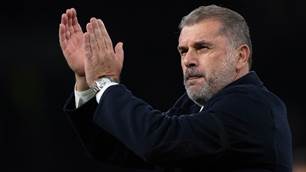Two days ago, Ange Postecoglou confirmed that he won’t be steering the Socceroos ship past this World Cup voyage.
While coaches are notoriously fickle creatures – able to turn on a dime – if Ange was to leave next year, or earlier, he’ll leave Australian football a much bolder, more rousing vessel than the one he inherited. He’ll be leaving a lifetime of memories for Socceroos fans.
Winning the Asian Cup, Australia’s first major trophy, on Australian soil.
The first Australian coach to lead us to the World Cup finals in 42 years.
That translucent shirt in Abu Dhabi.
Nevertheless, all good things must come to an end. Speaking about his future, Postecoglou was blunt regarding his future ambitions.
“Hopefully at least another 12 months and then that will be it," he said.
"I’ll move on. I want to coach overseas at some point and that will be as good a point as any.”
Whether Postecoglou joins a Chinese Super League club, as rumours suggest, or tries his luck in Europe, it’s doubtful his services to Australian football will end there.
There’s every chance he could revolutionise the way Australian coaches are seen overseas.
But with the World Cup and Confederations Cup still to play, results over the next 15 months will largely decide what happens next – and exactly how the country will regard his legacy.
If the Socceroos exceed expectations over the remainder of Postecoglou’s reign, and he still decides to leave – Football Federation Australia (FFA) has a pattern of installing direct replacements.
Following Guus Hiddink’s departure in 2006, the FFA promptly appointed Hiddink’s former assistant coach Pim Verbeek to the Socceroos top job. While it wasn’t an ultimately successful selection, it’s not necessarily a bad strategy.
A change in leadership and style often leads to a period of uncertainty – a stage many argue Australia’s still grappling with today - and the FFA’s response had traditionally been if it’s not broken, don’t fix it.

With attacking football now the FFA’s blueprint, succeeding Postecoglou with another Australian coach would be ideal. But few Australians come to mind who boast the combination of style and substance Ange brings to the table
Given Australia’s lack of home-grown coaching options, after Postecoglou, a foreign manager seems more likely. And while anything’s possible, Australia attracting a proven foreign coach with a flair for attacking football seems unlikely.
If we can’t, do we settle for anyone willing to continue Postecoglou’s style? And what happens if things go sour in Ange’s final months?
The Socceroos fight a mountainous task to qualify for the 2018 World Cup, and if they fail to leave an impact upon Russia in either of their two upcoming tournaments, should the FFA continue backing possession football?
Footballers may be creatures of habit, but as we’ve seen with Leicester City, they can lose confidence in a failing system very quickly. Sometimes changing the manager isn’t enough; sometimes the system has to go.
Admittedly, this is all hypothetical – 12 months can be an era in modern football and the FFA may have a surprising plan up their sleeve.
But with Australia’s past record of appointing replacements, perhaps the FFA should consider that - just like skinning a cat – there’s more than one way to win the world’s largest sporting competition.
Regardless of where Postecoglou goes from here, one of his most underrated achievements will be re-invoking excitement in the national team.
By wholeheartedly rebuilding the Socceroos, Ange reminded the Australian public that World Cup glory could, and should exist at the forefront of our national sporting psyche.
It’s a level of self-belief that may have dulled as results have withered, but potential paths to World Cup glory are a discussion we’ll continue to have. It’s high time – before Postecoglou, Johnny Warren last promoted the idea of winning the World Cup in 2003, and back then the Socceroos hadn’t qualified for almost 30 years.
In order to be taken seriously, however, the discussion must be peppered with realistic acknowledgements. Otherwise it risks seeming intangible and losing interest.

As the discussion over the world post-Postecoglou matures, the next phase is exploring the potential avenues to get our hands on the Jules Rimet Trophy. This involves identifying which best suits Australia’s current situation.
It’s worth acknowledging there’s more than one route to get there. Australia winning the World Cup isn’t as unrealistic as many people think.
In 2016 there were two major upsets. Leicester City won the English Premier League title and Portugal won the Euros. Although not identical, both sides won playing defensive, counter-attacking football.
Their style’s attractiveness was subjective, but their tactics instilled the self-belief and determination required to win a major tournament, in sides with little expectation, or experience of major success.
Possession football may be in vogue, but well-crafted counter attacking clearly earns results. Iceland - a country with a population smaller than Canberra - made the Euro quarter finals due to delightful crosses, tight organisation and long throw-ins alone.
Costa Rica made the 2014 World Cup quarter-finals on the back of similar defensive solidarity. These are nations whose resources, populace and even interest in football make Australia look like global heavyweights.
It’s so tempting, then, to adopt a similar approach. If Costa Rica can make the quarter finals, imagine what Australia - a nation with almost as many active footballers as the Central American country has people - can accomplish.
This isn't to say Australia's a distinct threat. Despite our sporting prowess, unlike China or the United States, we’re not a sleeping giant of global football.
But with over two million Australian participants in the beautiful game, and an unbeatable sporting ethos, the Socceroos have the potential to win the World Cup. With the addition of a comprehensive approach across all facets of the game, Australia’s potential begins to look very dangerous.
This relates to Postecoglou’s belief that Australia must overcome its ‘underdog’ mentality to be taken seriously on the global stage. It seems the right sentiment to inspire Australia to great accomplishments, but whether, as Postecoglou implies, it requires an aggressive style of football is doubtful.
There’s an argument that both attacking and defensive styles equally suit Australia. On the one hand, attacking football fits our stereotypical determination, athleticism and resolve.
In contrast, defensive football requires the sort of physical strength, aerial-prowess and dogged stubbornness that Australian sportspeople are famous for. In truth, Australia’s just suited to sport.
So, if both styles have the potential for success, which is more likely to deliver?
Again, Leicester City provide an example of how counter-attacking football can lead to incredible success, and then quick decline. Defensive football leaves less room for manoeuvre, if you’re not winning, where do you go from there?
But even Barcelona - the modern king of tiki taka – was punished in Pep Guardiola’s final season at the club, when they failed to adapt their style. Other teams worked them out, and when they did, the Catalans replaced Guardiola in the knowledge they had to adapt.
It’s not as if, should Australia master possession football, we’ll be able to retain that style forever. Possession’s touted as a way to increase pride in the national team, but there’s no such thing as an everlasting tactic in football.
And which do fans really respond to more? Exciting football or successful football? And where do you draw the line between the two?
An attacking style has its clear advantages. A cohesive, top-down approach from the Socceroos to grass-roots football is ideal, and possession-based styles are almost universally regarded as the ideal way to develop youth.
But engaging youth in the first place is equally important.
Australia shouldn’t forget that the attention Australian football receives - not to mention the fact Postecoglou’s taken seriously when he discusses Australia winning the World Cup - is largely predicated on the success of Guus Hiddink’s defensive side in 2006.
While Australia seeking to continue Postecoglou’s legacy first and foremost makes sense, his style is not the only way to secure long-term success. Similarly, it's not the only way to develop youth, or elicit pride in the Socceroos. When the post-Postecoglou era eventually arrives, Australia shouldn’t idolise one particular method at all costs.
Thanks to Ange, Australian football has reached a stage where we can look back on great success over multiple styles and coaches. He’s reminded us, time and time again that Australia doesn’t have to be scared of anything, or anyone.
So there’s no reason why continued adaptation and evolution is anything to be afraid of.
Related Articles

Champion A-League coach set to join Premier League giants

Under the gun: Spurs fans want Ange to be a loser in night of spite













